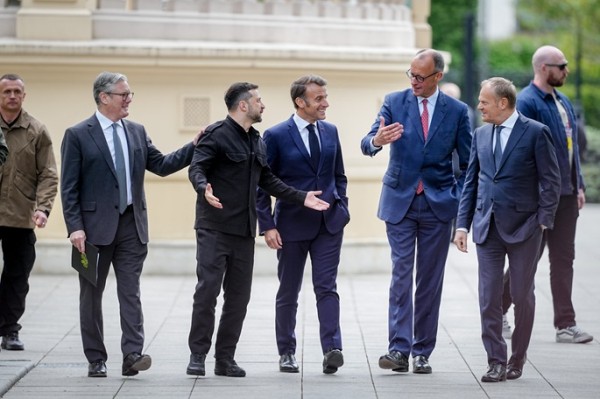
Ukraine and its Western allies — among them the recently elected German Chancellor Friedrich Merz — have proposed a 30-day ceasefire with Russia starting Monday, in what European leaders described as a united push to open the door to peace negotiations and end Moscow's three-year-old war against its neighbour, reported dpa.
"Ukraine and all allies are ready for a full unconditional ceasefire on land, air, and at sea for at least 30 days starting already on Monday," Ukrainian Foreign Minister Andrii Sybiha wrote on X.
He added that if Russia agrees and effective monitoring is ensured, the truce could pave the way for "confidence-building measures" and negotiations to achieve a durable peace.
Russia's response
The Kremlin, however, quickly rejected the plan and said it would not be intimidated by threats of more sanctions from Europe and the United States.
Zelensky, speaking at a press conference, said Russia's attempt "to impose any conditions is evidence of the intention to delay the war and sabotage diplomacy."
The 30-day proposal came during a high-level joint visit to Kiev by German Chancellor Friedrich Merz, French President Emmanuel Macron, British Prime Minister Keir Starmer and Polish Prime Minister Donald Tusk. The leaders held talks with Ukrainian President Volodymyr Zelensky and spoke by phone with US President Donald Trump, a conversation Sybiha called "fruitful."
Tusk emphasized the alignment of Western powers behind the ceasefire initiative. "For the first time in a long while, we feel that the entire free world is truly united," he said. Tusk noted the ceasefire proposal was first proposed by Trump, who has in the past blamed Zelensky for the war launched by Russia.
Macron pledges sought-after security guarantees
Macron reinforced the effort with a pledge of "robust security guarantees" for Ukraine, alongside continued military and financial support.
“Above all, we will continue to work to ensure that Ukraine has robust security guarantees, with a viable army structure” and deterrent capabilities, Macron said at a press conference. He noted that France and Britain are leading a 30-nation “coalition of the willing” to coordinate long-term post-ceasefire support.
“A just and lasting peace begins with a full and unconditional ceasefire,” Macron wrote separately on X. “If Moscow continues to obstruct, we will step up the pressure — together, as Europeans and in close coordination with the United States.”
Merz, on his first trip to Ukraine since becoming chancellor of Germany on Tuesday, warned that Russia would face severe consequences for rejecting the initiative.
“There will then be a massive tightening of sanctions and there will be further massive aid for Ukraine,” he told Germany’s Bild newspaper.
However, at a press conference in Kiev, Merz avoided committing publicly to sending German Taurus cruise missiles to Ukraine, saying such decisions would first be discussed with allies, including the US.
The Kremlin responded to the show of European solidarity with defiance.
“Trying to scare us with sanctions is futile,” Kremlin spokesman Dmitry Peskov told Russian state TV on Saturday. Speaking separately to ABC News, Peskov said any ceasefire must not provide a military advantage to Kiev and insisted that Western arms deliveries must stop as a condition for any truce.
Later, former Russian president Dmitry Medvedev issued a profane rejection of the ceasefire plan. Writing in English on X, Medvedev said its authors could “shove these peace plans up your pangender arses!”
He accused the visiting Western leaders of issuing threats rather than promoting peace: “Macron, Merz, Starmer, and Tusk were supposed to discuss peace in Kiev. Instead, they are blurting out threats against Russia,” he wrote.
Medvedev, now deputy head of Russia’s National Security Council, is known for his provocative rhetoric. His remarks came on top of Peskov’s earlier claims that Russia maintains the battlefield advantage and that Ukraine has repeatedly avoided what Moscow calls "real negotiations."
Upon arriving in Kiev on Saturday morning, the visiting European leaders joined Zelensky and First Lady Olena Zelenska at a memorial ceremony on Kiev’s Maidan Square, observing a moment of silence for victims of the war.
The makeshift public shrine on the square, created after Russia’s full-scale invasion in 2022, has become a symbol of national resilience, lined with thousands of flags, photographs and personal mementos.
(By Michael Fischer, Andreas Stein and Ulf Mauder)
Source: www.dailyfinland.fi


